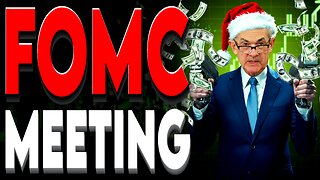Premium Only Content

How Does a Global Bond Sell Off Impact Various Sectors and What Can Investors Do to Navigate This?
Hello, Passive Income enthusiasts! Today, we're diving into a very pertinent topic, especially considering the recent events in the global financial markets. Our exploration is into the widespread implications of a global bond sell-off and how it ripples through various sectors, notably banks, insurance companies, pension funds, and even the private equity realm.
Now, we've all seen the headlines about the upheaval in the bond market. But how exactly does this domino effect take place, and what does it mean for investors, particularly those interested in establishing streams of passive income?
📉 1. Banks: Banks are heavily entwined with bonds, and as borrowing costs have rocketed to their highest in over a decade, they're facing some steep paper losses. An example here is US banks, where bond portfolios have seen losses close to a staggering $400bn, an unprecedented figure. The devaluation of these portfolios can lead to a cascade of impacts on their stability and profitability, ultimately reducing shareholder value and potentially impairing lending capabilities.
🔐 2. Insurance Companies: Insurers, especially life insurers, utilize bonds to back liabilities like pension obligations. The speedy surge in rates could prompt customers to liquidate long-term products, compelling insurers to unload bonds and possibly incur losses. This phenomenon brings about concerns regarding long-term solvency and the ability to meet obligations.
👴🏼 3. Pension Funds: For pension funds, higher yields on government bonds are typically a positive due to improvements in their funding position. However, a swift sell-off, like what was observed following a crisis in the UK, demands these pension schemes to prop up their hedging strategies with additional collateral, which might, in some scenarios, force them to liquidate less liquid assets, possibly at a loss.
🏦 4. Private Equity: Now, turning towards private equity, the sector which is generally associated with leveraging buyouts, the higher interest rates translate to more costly leverage for their investments and portfolio companies. It doesn’t just slow down dealmaking but also puts stress on companies to service their debt. When we sprinkle in inflation and economic slowdown, it’s potentially a recipe for trouble.
💼 5. Corporate Debt Markets: Amidst the bond yield ascension, the corporate debt markets, particularly in segments like US junk bonds, have seen their average yields propelled above 9.3%, inflating the borrowing costs for companies and pressuring those with significant leverage or vulnerable financial structures.
Given this multifaceted impact, how can passive income enthusiasts and investors navigate this complex scenario?
🛑 Identify & Mitigate Risks: Begin by reassessing your investment portfolio. Identify assets that may be particularly susceptible to a continued sell-off in the bond market. Diversification is key here to manage and mitigate potential risks.
💸 Exploring Alternative Investments: Diversifying your passive income streams through alternative investments, such as real estate, dividend stocks, peer-to-peer lending, or even venturing into cryptocurrencies (with a cautious and well-informed approach), can be an apt strategy to hedge against bond market volatility.
🔄 Rebalance Portfolio: Periodic rebalancing of your investment portfolio to align it with your investment goals and risk tolerance is imperative, especially amidst market turmoil.
📚 Continuous Learning: The market is ever-evolving. Always strive to enhance your knowledge, understand market dynamics, and explore new opportunities that align with your investment philosophy and risk profile.
In conclusion, the aftershocks of a global bond sell-off permeate various sectors and bring about a myriad of implications for businesses, financial institutions, and, of course, investors. By being proactive, diversifying wisely, and remaining informed, you can navigate through this tumultuous financial landscape while safeguarding and potentially growing your passive income streams.
If you found this discussion enlightening, be sure to hit the like button, subscribe, and click the bell icon so that you never miss an update on how to shape your financial future. I'm always here to answer your questions and guide your journey toward financial freedom! Stay savvy, investors!
For more information, please email ben@benjaminzmiller.com
-

Redacted News
2 hours agoBREAKING! WARMONGERS PUSHING TRUMP TO LAUNCH PRE-EMPTIVE WAR WITH IRAN | Redacted News
20.3K77 -
 1:00:26
1:00:26
Candace Show Podcast
1 hour agoPiers Morgan x Candace Owens | Candace Ep 123
5.99K53 -
 2:06:51
2:06:51
Darkhorse Podcast
4 hours agoThe 256th Evolutionary Lens with Bret Weinstein and Heather Heying
23.1K18 -
 LIVE
LIVE
Scammer Payback
2 hours agoCalling Scammer Live
255 watching -
 1:21:25
1:21:25
Mally_Mouse
5 hours agoLet's Yap About It - LIVE!
14.2K4 -
 5:35
5:35
Cooking with Gruel
21 hours agoMaking Fresh Salted Caramel
22.6K5 -
 16:16
16:16
DeVory Darkins
18 hours ago $6.76 earnedMedia Panics after Trump Threatens to Sue Media for Defamation
34.3K90 -
 2:15:34
2:15:34
Matt Kohrs
5 hours agoFed Powell Speech & FOMC Rate Decision
23.3K2 -
 LIVE
LIVE
StoneMountain64
4 hours agoThe MOST hyped game of the YEAR
183 watching -
 1:50:12
1:50:12
The Quartering
19 hours agoTim Pool SELLS TO DAILY WIRE? Never Eat Hot Dogs Again, Drones & More
85.8K25